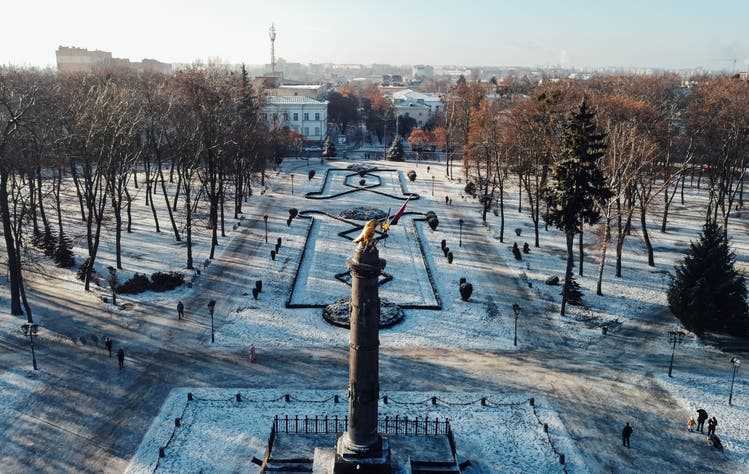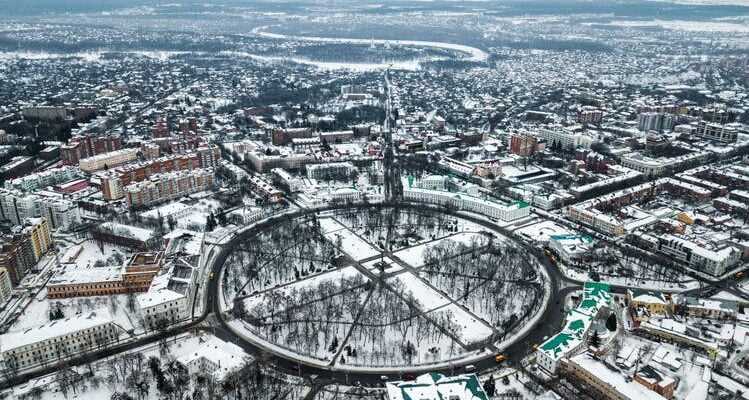Many Ukrainians feel like a pawn in the power struggle between Russia and the West. Not for the first time they are in this situation: the events of Poltava three centuries ago are a key to understanding what separates Russians and Ukrainians.
The Round Square of Poltava is the center and symbol of the city. The central column commemorates Russia’s military triumph in 1709.
The extent to which history has strained the relationship between Ukraine and Russia can be seen nowhere better than in Poltava. Here, in 1709, Tsar Peter the Great won a brilliant victory over the army of King Charles XII of Sweden. and thus demonstrated to the whole of Europe that Russia was to be reckoned with. Success in the Great Northern War transformed the Tsarist Empire, which until then had received little international attention, into a major European power. Appropriately, from then on it called itself an empire. After the Battle of Poltava, Peter the Great had medals of honor minted depicting him with a laurel wreath, like a Roman emperor.
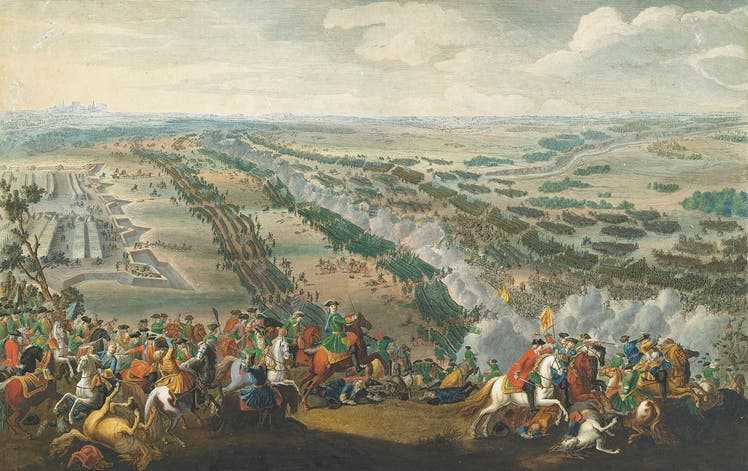
Tsar Peter the Great (recognizable by his green coat) in the middle of the battle – this is how the French history painter Pierre-Denis Martin, commissioned by the Tsar, imagined the Battle of Poltava.
Putin and the «reunification»
Unsurprisingly, Russian President Vladimir Putin, who probably sees himself as a significant asset to the Russian Empire, also referred to Poltava. In a well-received article from last summer, he not only constructed an extremely questionable national unity of Russians and Ukrainians; he also made it clear that he considers large parts of Ukraine to be historically Russian lands. Poltava and other regions were “reunited” with the main body of the Russian people thanks to the battle, he wrote. There is little doubt that Putin wants to reintegrate Ukraine into Moscow’s sphere of influence in order to secure Russia’s position as a great power.
From the Ukrainian point of view, this is completely different. «Brother peoples? That’s long since become a swear word!” said writer and reservist Vitaly Sapeka contemptuously during a conversation in Poltava. Sapeka, like thousands of other Ukrainians, volunteered for military service after the Russian military intervention in Donbass in 2014. When he was not accepted because of his advanced age, he joined a volunteer battalion, learned how to use weapons and served in the war zone for years. He is not impressed by the prospect of a major Russian attack in the coming months. “I would be happy to go to the front again and kill Russians,” he says.
In a somewhat more subtle way, the Russian claim to be a great power is rejected in the cityscape of Poltava. The Column of Glory, a memorial erected to commemorate the 100th anniversary of the battle and crowned by a golden Russian imperial eagle, still towers over the main square in the center of the city of 300,000 inhabitants. But Ukrainian patriots have put the blue and yellow Ukrainian state flag on the eagle on their own initiative and, on top of that, the black and red flag of the radical national movement. Every time the city administration had these symbols removed for “monument protection” reasons, the activists mounted the flags again.
Traitor or statesman?
The contradiction becomes perfect when you struggle through a few hundred meters further on the sidewalks covered with black ice and suddenly find yourself in front of a second monument in a wintry park. Ivan Masepa, the Ukrainian Cossack leader who was on the losing side together with the Swedes in the Battle of Poltava, has been looking down grimly from the pedestal since 2016.
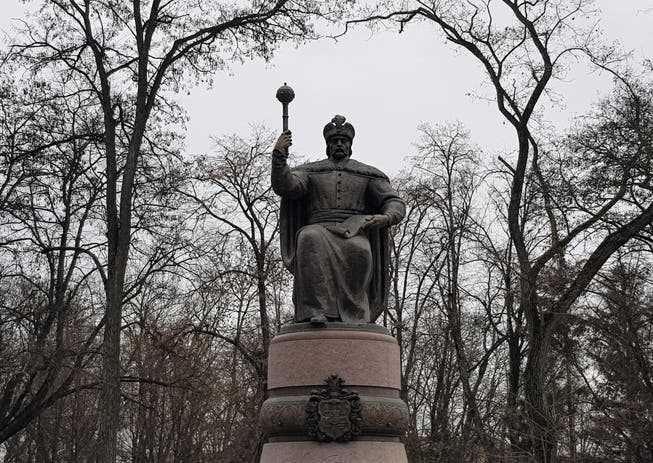
The monument to the Cossack leader Ivan Masepa in the center of Poltava.
A monument to Masepa – that would have been unthinkable in the tsarist and Soviet era. At the time, the Ukrainian statesman was considered the epitome of the traitor. With their works, the poet Alexander Pushkin and the composer Pyotr Tchaikovsky shaped the image of a villain that generations of Russians and Ukrainians grew up with. Putin, too, had only contempt for the Cossack leader in his aforementioned essay.
But Masepa is an important identification figure for the young Ukrainian state. He was the elected leader of a 17th- and 18th-century state, the Cossack Hetmanate, which can be considered the forerunner of today’s Ukraine. Cossacks were combat units that had formed through the settlement of escaped serfs in the region. In the hard-to-control areas between Poland, the Ottoman Empire and Russia, they successfully preserved their freedom for a long time. Masepa’s controversial switch – away from an alliance with Moscow and towards Sweden – can be seen as an attempt to protect his state from increasing Russian encroachment.
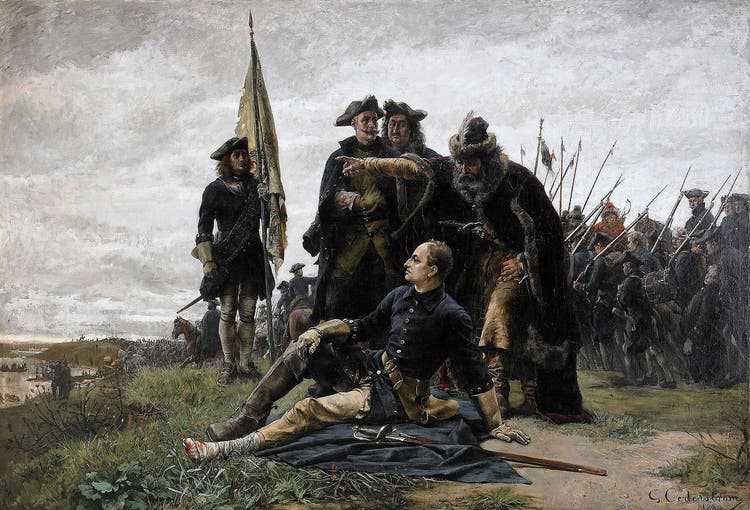
Wounded and defeated militarily: King Karl of Sweden had no choice but to flee, accompanied by the Cossack leader Masepa (with a plumed hat). Painting by Gustaf Cederstrom from the 1880s.
Triumph for some, disaster for others
The accusation of treason is unfounded, argues Vita Harmash, curator of the Poltava Battle Museum. Masepa had no choice but to make a pact with Sweden. On the one hand, the tsar curtailed the freedoms of the hetmanate, on the other hand, dissatisfaction with Russia’s military service had built up among the Cossacks. Russia has also refused any help against the advance of the Swedes into Ukraine.
The Battle of Poltava thus occupies a central role in the historical consciousness of both Russia and Ukraine. But the interpretations could not be more different. While the Kremlin envisions the triumph of Peter the Great and talks of reunification, for Ukraine Poltava is synonymous with a catastrophe that heralded the fall of the hetmanate and centuries of oppression.
The Battle Museum, which dates back to the Soviet era, is gradually being adapted to Ukrainian national ideas. The statue of Peter the Great in front of the entrance remains untouched, but a large painting of Masepa has recently been hanging inside. It shows the loser of the battle in the habit of a cultivated European statesman. A new hall has been added, in which ten Great Russian myths about the battle are dismantled. Many of these myths were deliberately circulated by Peter the Great, says Wita Harmasch. “Even then there was something like an information war, and now it’s flaring up again.”
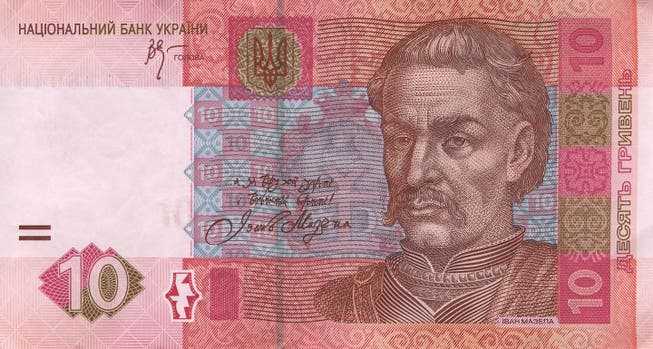
Ivan Masepa – the epitome of a traitor from the Russian point of view – now adorns Ukraine’s 10 hryvnia banknote.
Russia also draws parallels between then and now. When Swedish Defense Minister Peter Hultqvist recently advocated expanding his country’s military training mission in Ukraine, the Russian embassy in Stockholm responded with a bitter comment and a reference to the crushing defeat of Charles XII: Hultqvist was not the first Swedish military leader to attempts to intimidate Russia with the power of its heroic army, the embassy wrote sarcastically. But apparently the Swedes didn’t heed the lesson of the Battle of Poltava.
Russia, on the other hand, should not have escaped the notice that the Ukrainians have learned their lessons. Their attachment to their own country is great; the rhetoric about national community with the Russians fell on sterile ground in Poltava as well. “We will not surrender,” says geophysicist Viktor Shcherbanyuk, who temporarily commanded a tank company during the Donbass war. «Of course, Moscow wants to rebuild the Soviet Union. But too much time has passed.” Thirty years of Ukraine’s independence meant that a whole new generation had grown up that the Soviet Union had never seen again. If Russia decides to invade, the vast majority of Poltava’s population will reject the occupation, says Shcherbanyuk.
serenity in the face of the threat of war
It is difficult to say how many Ukrainians would take part in a partisan war in such a scenario, as promised by the writer-soldier Vitaly Sapeka quoted at the beginning. But the state is now also laying the foundations for a guerrilla struggle with certain preparations. However, most Poltava residents do not seem to expect war.
If you ask passers-by in the windswept streets, the most common answer is that it won’t get that far. Yes, she’s been following the news, but she’s not worried, says a young mother. A woman in her mid-fifties thinks it’s all just political games. A music student whose name has recently been on the mobilization list seems a little more thoughtful. But he also considers a major attack to be quite unlikely.
The German writer Christoph Brumme, who has lived in Poltava for many years, observes the same thing. “It’s beyond people’s imagination that there could be an invasion.” Putin has proved his brutality enough in Chechnya and later in Syria, where Russia’s air force has deliberately bombed hospitals. Unlike most Ukrainians, Brumme takes precautions so that he can flee quickly if necessary. Once the few bridges over the Dnipro River have been blown up, there will be no further passage to the west.
There is no trace of such gloomy thoughts in the festively decorated city center – the orthodox Christmas season, together with its merry fun at the fair, lasted until the middle of this week. Local politicians also have their usual bickering. Poltava’s mayor was almost overthrown in late December. After he parroted Moscow propaganda phrases on a pro-Russian TV station, the majority of city parliamentarians voted to remove him. Since they just missed the necessary two-thirds majority, the mayor, who is particularly popular with pensioners and government employees, was able to keep his office.
Nevertheless, the case showed that those who show sympathy for Russia in Ukraine are politically risking their necks and necks.
